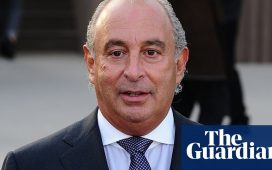Unlock the Editor’s Digest for free
Roula Khalaf, Editor of the FT, selects her favourite stories in this weekly newsletter.
Giselle Khoury, the grand dame of Arab journalism, was known for her incisive questions asked softly and with a smile, her empathy in even the toughest interviews, the breadth of her knowledge and network and her uncompromising defence of freedom of expression and pluralism.
Khoury, who has died aged 62, was taken too soon by a cancer which she battled for two and a half years. She leaves behind a country and a city, Beirut, that she loved deeply because of all it had given her, and despite all it had taken away from her.
For more than three decades, the TV personality and interviewer spoke to hundreds of Lebanese, Arab and international intellectuals, artists, politicians and dissidents, from Egyptian president Abdel Fattah al-Sisi to the late Palestinian leader Yasser Arafat, to Lebanese composer and intellectual Ziad Rahbani and US diplomat and former senator John Kerry.
Khoury came of age during Lebanon’s 1975-1990 civil war, and became a journalist in response to the tragedy she saw unfolding in her country. She started her career in 1986 as the host of a cultural talk show, but by 1992 she had moved towards politics with her show Dialogue of a Lifetime on the Lebanese Broadcasting Corporation channel.
She was a trailblazer as one of the first female Arab journalists hosting on-screen conversations of this kind. Her cross-examinations of politicians were beamed from Lebanon, the country with the freest press in the Arab world, into millions of homes around the Mena region.
“The Arab world has lost a professional with very high standards,” said Jordan’s former foreign minister Marwan Muasher, who became friends with Khoury after she first interviewed him in 2002. By then, she was presenting a show on Al Arabiya, In Arabic. “She was always thoughtful, always prepared with extensive knowledge not just about the subject but the person she was interviewing.”
Khoury’s life mirrored the ups and downs of her country. Rising as a star journalist at a time of relative prosperity and calm for Lebanon, she fell in love with her second husband, Samir Kassir, in the mid-1990s.
Both divorced and with two children each, they finally married in 2004. Kassir, a prominent Palestinian-Lebanese journalist and intellectual, was one of the earliest, acerbic critics of the Syrian occupation of Lebanon. Author of a seminal book about Beirut’s history, he was constantly harassed by Lebanese and Syrian intelligence services.

“We lived together, constantly under threat, but we were happy. Beirut was a witness to our unique love story, a story whose hero was the city’s historian,” Khoury wrote later. “When we were walking in Beirut’s streets, we didn’t know we were like birds flying towards their death.”
In February 2005, Lebanon’s former prime minister Rafiq Hariri was assassinated in Beirut, his murder blamed on Damascus. Kassir became a leading figure in the uprising against Syria’s stranglehold on Lebanon. In June 2005, he was assassinated. Khoury was a widow barely 10 months into her marriage.
In 2006, she turned her grief into action and launched the Samir Kassir Foundation, dedicated to promoting her and her late husband’s shared values: supporting freedom of thought through conferences and an art festival, as well as monitoring and defending freedom of the press through a sister organisation, SKeyes, and helping to promote a new generation of Arab journalists.
“I decided to live to remind the assassins that murdering a body doesn’t kill its soul,” she said, when explaining why she embarked on the project.
The year of Kassir’s death would turn out to be a turning point for Lebanon, starting a downhill trend from which the country has yet to recover. After the Beirut port explosion of August 2020, Khoury made the painful choice to leave for the United Arab Emirates, where she joined Sky News Arabia to host a new talk show, With Giselle. In 2019, her commitment to her work had been recognised by France, where she was decorated with the Légion d’honneur.
In August of this year, she was interviewed by her friend, the journalist Ricardo Karam, in a conversation that sounded like a goodbye. She became teary as she talked about her experience as an exile from Beirut.
Khoury died before seeing justice delivered for her husband’s assassination. She leaves behind a daughter and son from her first marriage, three grandchildren upon whom she doted, and a foundation that will continue her mission of supporting freedom of expression in a broken country.











